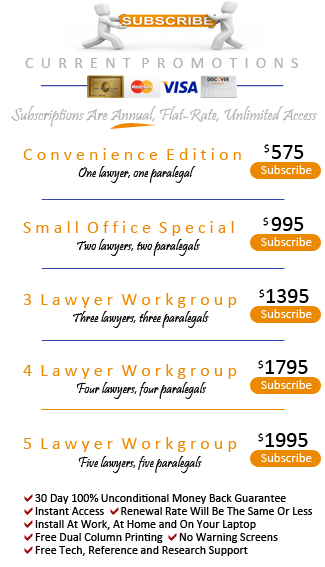 |
| P H I L O S O P H Y |
 |
"Forget for a
minute that you’re a lawyer and pretend you’re
my paralegal." |
Mark Whitney
- |
|
| |
We've got a Federal case implicating standing.
Our side likes Flast v. Cohen, 392 U.S.
83 (1968) and the United States likes
Schlesinger v. Reservists, 418 U.S. 208
(1968).
For starters, I
want every case -- current within the most
recent business day -- from only our binding
Federal circuit and district, mentioning both
Flast and Schlesinger. And I want it now!
Using your current toolset, how would you do that in a
single search?
I happen to know, that unless you subscribe to
Westlawnext – which is very, very expensive – it
is impossible for you to perform this simple
task, and that before Westlawnext, this was only
possible using our database.
My subscribers do it in about 10 seconds and they do it
like this:
1. Click TheLaw.net Icon
It
boots right to the search screen. No user/name
or password.
2. Deactivate Select All
3. Activate the databases for only
the D.C. Circuit and District
4. Enter: “392 U.S. 83” and “418 U.S. 208”
5. SEARCH
Computers make this possible. TheLaw.net makes it
doable.
I started TheLaw.net nearly 15 years ago
because West and Lexis actually
prevented me from performing a litany of simple
computing tasks. It
was like they stayed up late thinking of ways to
defeat logic.
I don't just want a list of generic results. I want knowledge in
the form of a dynamic, interactive results screen
that tells me the most cited case. I want to see
the seminal case matching my criteria. I want to
see the most relevant case based on search term
proximity, numerosity, density and diversity. I
want to cross-reference the most cited opinions with the
most relevant opinions, telling me which opinions are
most cited for my point of law. Again --
computers make these things possible, while
TheLaw.net makes them doable and
indispensable.
As a result of my personal frustration with the
fragmented state of legal research, today my subscribers
are able to perform
the foregoing detailed level of individualized, legal
research, because, in 2008, after nine years in
business, we upgraded them – for free (as
always) -- to the first version of
Citetrak, our best-of-breed,
first-mover algorithm.
We teach our subscribers to think in terms of Codes and
Concepts. The industry assigns codes to
statutes, rules, regulations and opinions. But,
when lawyers think “opinion” they think
“citation.” When my subscribers hear Flast
and Schlesinger, it doesn’t call to
mind two cases, or two party names, it calls to
mind two, unique codes, that will quickly
resolve their search to “yes” or “no.”
From there, legal research is completely
individualized.
Book research -- by definition -- was a one-size-fits-all
proposition because researchers relied on
partial, man-made indexes of opinions. Computers,
by contrast,
index everything and it's only with the ability
to
compare human indexing with computerized
indexing, that today we realize how much the
humans were missing.
When you combine a great database with a
great algorithm that delivers pure results, you
can say:
“OK, Robot, give me a list of opinions – if any --
from only these courts, citing my
opinion,
for my point-of-law or concept.” |
-
It doesn’t get any better than that. But, if your
thought processes are hampered by a database
with warning screens, upsells, roadblocks and
tollbooths, as the proverbial Old Timer from my
home state of Vermont says: "You can’t get
there from here."
Two years after we upgraded our subscribers to our new
algorithm, the people over at Thomson-Reuter’s
rolled out Westlawnext, finally making
it possible for handful users who can afford national
access, to simultaneously activate any
combination of Federal and state jurisdictions.
(This is still impossible with Westlaw and
Lexis.)
Our flagship application – TheLaw.net Equalizer
– includes password and user-name-free access to a
perpetually-updated, comprehensive,
fully-enhanced, syndicated, proprietary,
searchable, citable, checkable database of
judicial opinions that is used by 50% of the
attorneys in the United States; positioning this
database ahead of Lexis and just behind Westlaw
in terms of market penetration and acceptance.
Westlawnext rents for up to $4,000 an hour. TheLaw.net
still rents for less than $50 a month
annualized, upgrades are always free, and your
renewal rate is guaranteed to be the same or
less.
John West built an empire on key numbers,
headnotes and annotations. By definition, these
hand-crafted resources represent a partial index
of judicial opinions. But, they were great
because they kept you from having to read all of
the opinions in the library. Westlaw is still
defined tools designed for
book researchers. In my opinion, Westlawnext --
like TheLaw.net -- is all about the algorithm.
We’ve been in business for nearly 15 years and we
happily cede large research environments to
Thomson Reuters. The only reason TheLaw.net
doesn’t work as the go-to tool in such
environments, is that culturally you just can’t
issue a memo to a firm of 2,000 lawyers that
says, “Heads up! We’re using TheLaw.net now.”
The irony is that today, the best algorithm in the
business is not used by the AMLAW 1,000. It’s
used by practitioners in small to medium
research environments from coast-to-coast.
TheLaw.net is like the iPhone. You look at it, you know
how to use it and it exceeds expectations. And
the
database is ubiquitous like the iPhone. A couple of years back,
an attorney sued the company, having previously
lobbied his local city council to put a law on
the books allowing him to collect $500 every time
someone sends him an email he didn’t request. We
forced a trial and after deliberating less than
30 minutes, a jury ruled in our favor. What
interested me the most, is that counsel for the plaintiff,
our counsel and the judge, all had paid
access to the same database that's available to
you right now for less than $50 a month
annualized.
If, like our subscribers, you have the ability – in a
single click – to call up every opinion, citing
your opinion for your point-of-law and/or
concept(s), from the court(s) you care about
most, and a dynamic, interactive, results screen
allowing you to sift and sort by first/last
case, most/least relevant, most/least cited,
party name and court hierarchy, what more do you
want?
It has always been our mantra to give everyone
everything and let the best lawyer win. This
seems consistent with principles of fundamental
fairness. More than any other company,
TheLaw.net is responsible for debunking the
notion normalized during the last quarter of the
last century, that researchers in large
environments should see all the law, while
researchers in small environments should be
content with a paltry slice.
You’re five minutes and less than $50 a month away from
using the best algorithm ever developed for
performing real, national legal research from
your desktop.
As always, we look forward to being of service! |
|
|
 |
|
|
|
|
|
|
|
|
|
|
|
|
|

